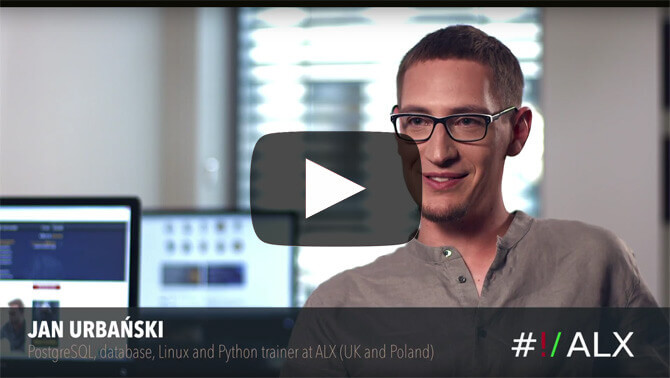Learn how to program in Python.
Join the bootcamp and change your professional life. We teach comprehensively and intensively - from the very basics!
-
The knowledge and skills you will gain:programmer's toolbox, Python libraries, Django, database fundamentals, JSON, data analysis, scientific calculations
-
Duration:80 hours + 40 hours work from home (we provide all training materials) = 120 hours in total
-
Requirements:basic computer skills, learn from scratch course
-
Intended for:- people who want to become a junior programmer
- analysts
- engineers and scientists
- webmasters -
Choose the type that best fits your schedule:
- weekends (Sat-Sun, approximately every two weeks)
- day classes (a 4-day block and two 3-day blocks, approximately every 2 weeks)
- evening classes (2 times a week, 18 - 20:30, for approximately 3 months)
-
Class size:max. 15 people
-
Admission conditions:no requirements, completely basic course
-
Location:Remote (online live with a trainer and a group) or Warsaw (Poland)
-
Price:1140 EUR
This is a bootcamp that teaches Python from the basics. Python is one of the most intuitive and universal programming languages in the world. You can use it in "big data", for engineering or scientific calculations, you can write a simple script in it, a stand-alone application or create a powerful Internet service. It is a language known for great code readability and countless possibilities.
The course is run by an experienced Python programmer. The bootcamp program has been adapted to the requirements of the current job market.
Our course is intended for people who have never had any previous contact with programming, because anyone can learn Python! But we warn you that it will not be that easy - when you join our bootcamp you have to be ready for many hours of hard work and studying (also at home). As a result - after this course - regardless of your education and work experience - you will have a chance to learn programming.
Who uses Python?
Many international companies use Python for billions of dollars’ worth of projects and applications - Google and IBM are good examples. Microsoft and Apple offer full support for Python on their operating systems and development platforms.
A lot of popular websites are written in Python - e.g. YouTube. The creators of Youtube have repeatedly emphasized the capabilities of Python as well as the rapid implementation of new functionalities through readable code that is easy to extend and update. Python's creator, Guido van Rossum, has worked for Google for years and currently works for Dropbox.
NASA uses an application written in Python to manage shuttle launch control.
From games to "big data" - Python's versatility

Python is a comprehensive language. It was created to improve everyday work - not just for programmers. It can be used for calculations, creating computer games, automating everyday activities and as a web application engine. You can also use Python in web applications or scripts, e.g. generating statements and reports.
What do you need to know to join the Python bootcamp?

You don't have to know how to program before joining the course and we don't expect you to have had any previous contact with Python - this is a course from the very basics. We only require general computer skills (copying files, using a text editor) and most importantly – to be able to efficiently use a keyboard.
Programming, especially at the beginning, is difficult and getting to know it can be compared to learning a foreign language or learning how to play a musical instrument. Therefore, in order to be successful in the course you have to have personal motivation and predisposition - our experience shows that during the bootcamps the people who achieve the most are the ones that are systematic and have an analytical approach to problems. It is also important to have sufficient time at home for practicing.
Python as a first programming language?
Yes! It's an excellent idea. Read here why ...
If you want to start a programming career, Python is the perfect language to start with. It is versatile, intuitive and easy to learn. Many people who consider learning to program, whether by themselves with tutorials and e-books, studying IT or on a programming course - always ask the same questions.
-
"AM I SUITABLE TO BECOME A PROGRAMMER? I
haven't studied IT ... "
We have heard this statement many times at ALX. Our answer is always: no, you don't need to have finished IT studies to program well. Many programmers do not have IT education and code better than graduates. Skills and practice are more important than a university diploma. Programming is a philosophy - it's like a new way of thinking – after the first few hours of the course and your first line of code you will understand that a programmer must have a very clear approach to solving each problem and he must be well-organized. A lot depends on your predispositions - if you have an analytical mind, you like to solve logical puzzles, numbers do not bother you and you are motivated - you can become a great programmer.
-
"HOW QUICKLY WILL I LEARN TO
PROGRAM?"
It all depends on how you learn.

Will you choose studies?
A few years of studying await you, including studying things that will never be useful in your professional life.

Will you choose independent studying?
The experiences of dozens of our students who have also tried this method show that finding the right books and tutorials takes more time than actually working through them. Often, it turns out that halfway through the tutorial I find out that it’s not good for me or does not solve the problem that I have encountered and I have to look for a new one, starting from the beginning and learning unnecessary things once again. It’s good to reach for books when you have already learned the foundations and know what your own capabilities and needs are.

The best way for you to learn the programming profession is through practice
- from someone who has done similar projects thousands of times - from an experienced, professional programmer. By far the fastest way to learn programming is a course at a programming school where after the very first few hours you start to write your own code!

Python - a pleasant language to learn
Python code is easier to read than other languages and most importantly, requires less writing than other languages - so in order to get a specific result you write less in Python than for instance in Java. Shorter code means less risk of errors and cheaper code maintenance. Python is well designed, transparent and consistent. Many beginner programmers praise learning Python, because it is relatively easy to remember and in case of any problems you can easily find the error or the function you need.
Do Python programmers find jobs easily?
For sure. The demand for programmers increases each year. The huge shortage of staff is caused by the fact that we have a growing demand for new technologies, efficient applications, professional websites and programs improving the work of enterprises. Without any doubt the profession of a programmer is a promising occupation - because after all, we are growing a generation of tablets and phones.
And it’s profitable! If you study hard you will certainly work as a programmer in an industry that cares about its employees.
How popular is Python?
According to the TIOBE ranking Python is in 5th place in terms of the number of queries in major search engines and it is assumed that its popularity will continue to increase because in the last 5 years it has had the highest growth rate (exactly 6.8%, for example PHP has -5.0%).
Bootcamp Python is a back-end course.
Back-end vs. front-end. Good to know.
At the Python bootcamp you learn programming basics in the back-end, that you can then use in any way you wish. Here you will learn the Python language, logic, architecture, object-oriented programming (OOP) and good programming practices. The trainer will teach you loops, conditional instructions and how to interact with files on a disk. He will show you how to display the results in the console. However, it is worth knowing that there are two career paths in IT. Efficient applications and systems require a front-end in addition to a back-end.

Back-end programmer
He deals with what the user cannot see - databases, application architecture, calculations, security and performance. For the back-end it is not the appearance that counts but the logic of the action and the goal - "it should work and be prepared for all possible scenarios and cases".

Front-end programmer
He is responsible for what the user will see on the monitor. In the case of web applications, these are page templates (HTML), interactivity of the web application (JavaScript), the appearance of individual elements on the page (CSS). The application / website should be intuitive, transparent and pleasant looking.
Who usually comes to this course?
PEOPLE WHO WANT TO START A CAREER IN IT AND BECOME A JUNIOR PROGRAMMER - FROM SCRATCH.
We teach not only the programming language - we teach how to think like a programmer!

This course has been prepared for beginners who have not had prior contact with programming and want to start a career as a junior programmer.
Most graduates that have taken part in this course are people without technical education. You only need to know how to use a computer – how to copy files, create folders, write efficiently on a keyboard. Everyone who thinks about the career of a programmer must know that programming is not just knowledge of the programming language. Programming is a way of thinking, it's most importantly getting to know computer concepts and technologies, the ability to navigate efficiently in the IT environment and practice, a lot of practice – just by writing code!
ANALYSTS WHO NEED TO IMPROVE AND SPEED UP THEIR WORK.
Analysts for whom Excel is not a sufficient enough tool.

Many participants of this course are employees of banks, insurance companies, commercial and service enterprises, the telecommunications industry and IT companies. Managers who need to draw conclusions, experienced analysts who process huge amounts of data on a daily basis - they create models and forecasts on which the fate of enterprises often depend. The degree of advancement of this work brings them closer to the work of an engineer. The ability to program and automate work is therefore something natural on the career path for such people.
Because of the explosion of digital data, nowadays it is not enough for an analyst to process huge amounts of data. It is equally important for him to do it very efficiently and in an optimal way - skillfully using technologies available on the market!
Learning a programming language for an analyst is like hitting the jackpot!
Python is an open and flexible programming language that has a huge range of advanced analytical tools and libraries. Knowing Python allows an analyst to perform very complex analyses faster and easier. It allows him to use ready-made libraries for his analyses - and this means faster, more efficient work. The trainer who runs this bootcamp has had many years of professional experience. He is professionally active all the time and uses Python in his work. The rapid development of new technologies means that only a person who works in the profession is able to pass on the most current knowledge and methods of its use.
Advantages of Python for an analyst:
- Python is free (as opposed to tools like Matlab)
- Python brings an analyst's work closer to the work of a programmer.
- It allows for complete work automation therefore it expands the possibilities offered by Excel.
- It is popular, available and known all over the world.
- It is simple and because of this, after the course, any analyst will be able to use the acquired knowledge almost immediately.
Send your entire analytical department to this course.
We have a broad experience in training analytical departments. Whilst training a group of analysts from a given company, we prepare a practical programme aimed at the specific industry they work in, so that the participants can fully benefit from the training.
This type of training significantly expands the capabilities of your analytical team. The ability to use the Python programming language will significantly increase the speed of delivering advanced analysis and improve their quality.

WEBMASTERES WHO WANT TO EFFICIENTLY CREATE MODERN WEBSITES

Python has been used to efficiently and quickly create modern websites with great functionality. Creating dynamic websites is very easy and effective thanks to very good frameworks such as Django. Python services offer a lot of possibilities thanks to the comprehensive collection of modules and libraries. Django is known for automatically generated administrative panels that are used, among others, in content management services.
We teach Django!
Here you will learn the modern framework for creating web applications.
- Speed
- A minimum amount of code
- Clear structure

Django is the perfect choice for people who are starting to write web applications. It is an open and free
framework that allows you to create elegant and modern services. It provides an automatic administrative
interface, nice URLs and an excellent thought-out template system. It was created in 2003 for the Lawrence
Journal-World news portal. The requirements of the journalistic environment are enormous and Django
fulfilled
them perfectly: it was simple to use and allowed to create ready applications in a very short time.
Pinterest, Instagram, The Washington Times - they all use Django.
Course Program

The programming environment and every programmer’s toolbox (i.e. basic programming topics)

Programming in Python (libraries, data structures, functions)

JSON format support (a data exchange format that’s universal for many programming languages)

Applications with a graphical user interface

Working with data

Django framework

Scientific calculations
Certificate

After completing the course, you will receive a certificate signed by ALX with a detailed list of your acquired skills. Each certificate has a unique identifier and an electronic version (regardless of whether the paper version has also been ordered). If you wish, you can share your certificate by pasting its URL – for example to your profile on a social or professional network or into your CV.
LISTEN TO ONE OF THE TRAINERS.

Our teaching methods

Teaching in small groups - live online with your trainer and group, in our classrooms in Warsaw, Poland - or at your company
We run the Bootcamp as a live, online training course, led by an instructor and with your group 100% of the time. Like classes at schools at the times of COVID. Or in specially equipped, air-conditioned rooms in Warsaw, Poland. You work in a group - this way of learning programming is faster. And you also practice teamwork. So you can work in a team of programmers - immediately after completing the course.

A lot of practice under a trainer’s supervision!
Theory alone is never enough. To program professionally you need to have specific practical skills, only then you become an attractive candidate on the job market. We don't have lectures on theory - you only learn practical things at bootcamp. There is always a trainer with you who you can ask for help at any time.

Studying at home between classes.
To go through a programming bootcamp you need to be highly motivated and be ready to study hard at home as well. There is a break between course modules - a week or 2 weeks. Use it for studying, practicing and exercises. Your trainer will give you specifically prepared materials and tasks - only a large number of exercises will help you embed the acquired knowledge and quickly master the technology.
Bootcamp. How do we teach?
We teach by using the bootcamp method. The word "bootcamp" comes from the US Army and means extreme training which transforms recruits into proper soldiers - capable of fighting immediately. Programming bootcamps are intense, practice-oriented training programs. Students will spend many hours working hard. After finishing our bootcamp you are a junior programmer ready to go to work (but also to continue learning).

- We focus on small groups and a relaxed atmosphere!
We run our courses online or on-site in Warsaw, Poland or at your company. Throughout the whole course you work in a small group - just like in foreign language schools. This way you learn faster but you also prepare to work in a team - because a programmer does not work on a desert island - you need to be able to work in a team!
- We focus on practice and contact with the trainer!
No boring lectures - you only learn practical things with us - our course is more of a workshop than the lectures you know from a university. There is always a trainer with you who you can ask for help at any time. We know from experience that theory alone is never enough. To program professionally you need to have specific practical skills - then you become an attractive candidate on the job market.
Is bootcamp a big expense?
Spread it out in installments at no additional cost.

Participation in the bootcamp is an important investment for many of our students. It is an investment in your skills and a chance to get your dream, well-paid job in the IT industry.
It is also a considerable expense!
We know this and that is why we offer convenient fees for our bootcamps in an installment system without any additional costs.
You pay only as much as the course costs.
How to pay for bootcamp in installments?

The process is very simple - you do not have to contact any bank, you do not need to undergo complex verifications, you only need an ID document - you handle everything with our company. Check it out >>
Trainers - professional programmers
Even the best prepared course program will not work without a good, ready to listen and experienced lecturer. We are very well aware of this!
That is why our trainers are the best. They have many years of experience in training, teaching and software development. They are practitioners - people who lead classes that are lively and full of realistic examples.
One bootcamp, two motivations
-
![Dla pracownika]()
Are you a private individual? If you do well then after the bootcamp we will help you find a job in IT.
-
![Dla pracodawcy]()
Are you an employer? Develop your employee's skills – send them to bootcamp!
Testimonials
Read what our customers say about our work.

The training was conducted at a high technical and organizational level and the involvement of the organizers deserves high recognition.

The participants of the course highly rated the training program, teaching materials as well as the competences and commitment of the lecturers. (...) We recommend ALX as a partner guaranteeing the proper performance of the service.

We are very pleased with the organization of the training. All trainings and trainers received high marks in surveys from our employees.

The implementation of the training program was highly appreciated by the course participants. ALX can be recommended as a reliable business partner in the field of IT training, with a staff of lecturers with extensive experience.
Course programme
- Introduction to programming
- the basics of computer operation
- operating systems, programs, frameworks and libraries
- overview of programming languages
- Introduction to the Python language
- genesis and history of Python
- applications and possibilities
- Python 2.x vs. Python 3.x
- Installation and configuration of the environment
- Python interpreter
- virtual environment (venv)
- integrated development environment (IDE) (‘PyCharm’ editor)
- The basics of the Python language syntax
- interaction with the user
- variables and basic data types
- data structures
- conditional statement
- loops
- comprehensions
- Procedural programming
- basics of defining functions
- passing arguments
- documentation and annotations
- Object-oriented programming
- basis for defining classes
- special methods
- static and class methods
- inheritance
- Exception handling
- throwing and capturing exceptions
- defining your own exceptions
- Code organisation
- modules and packages
- project structure
- Python Standard Library
- regular expressions (`re` module)
- handling command line parameters (`argparse` module)
- handling date and time (`datetime` module)
- advanced collections (`collections` module)
- graphical user interface (GUI) (tkinter module)
- Installation of external libraries
- package repository (PyPI)
- package installer (the `pip` tool)
- management of dependencies in the project
- Input / output operations
- file operations
- HTTP queries
- object serialization (with `json` and `pickle` modules)
- Testing and debugging software
- testing using the standard library (`unittest` module)
- external tools supporting testing (`pytest` project)
- debugging code (module `pdb` and debugger built into `PyCharm`)
- Python applications
- web applications (`Django` framework)
- data analysis and visualization (`pandas` and `matplotlib` libraries)
- scientific calculations (`SciPy` and `NumPy` libraries)
- Good programming practices in Python
- coding style and conventions (PEP8)
- idiomatic solutions

